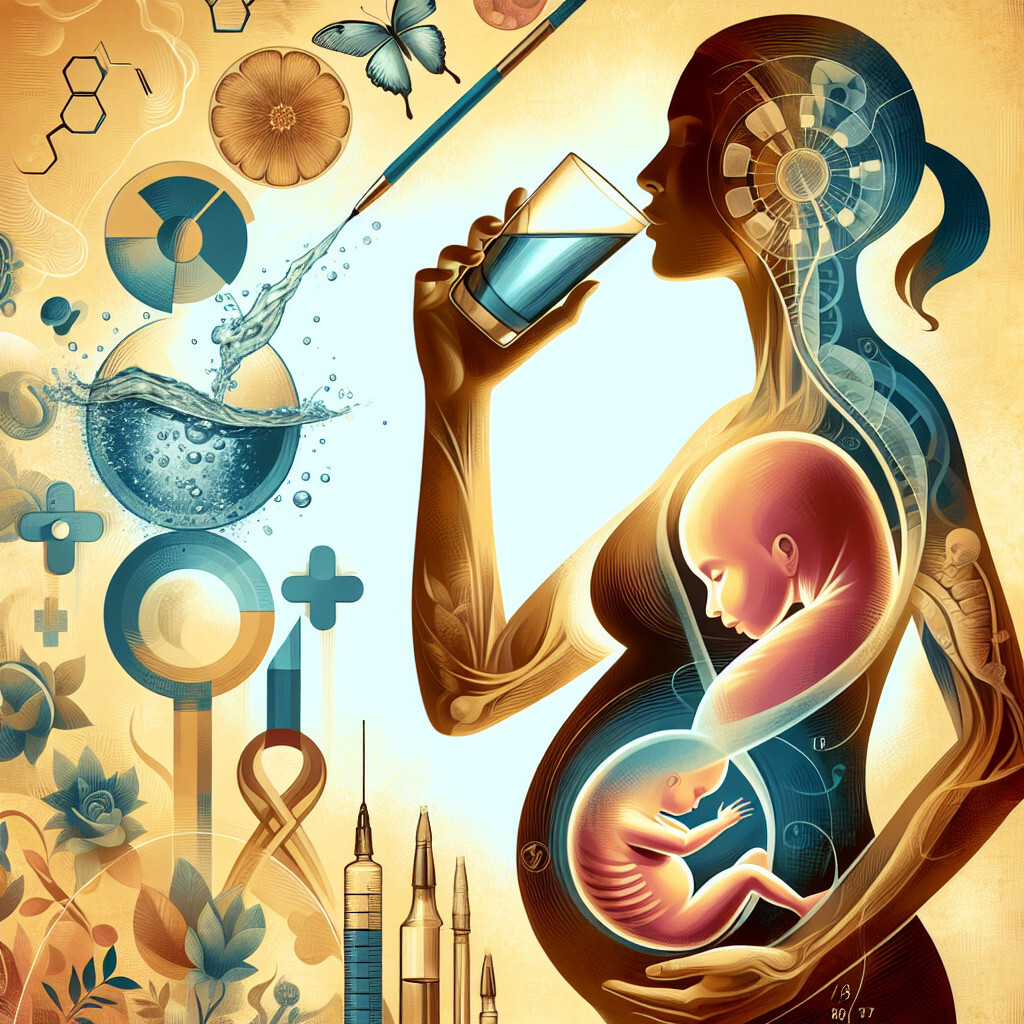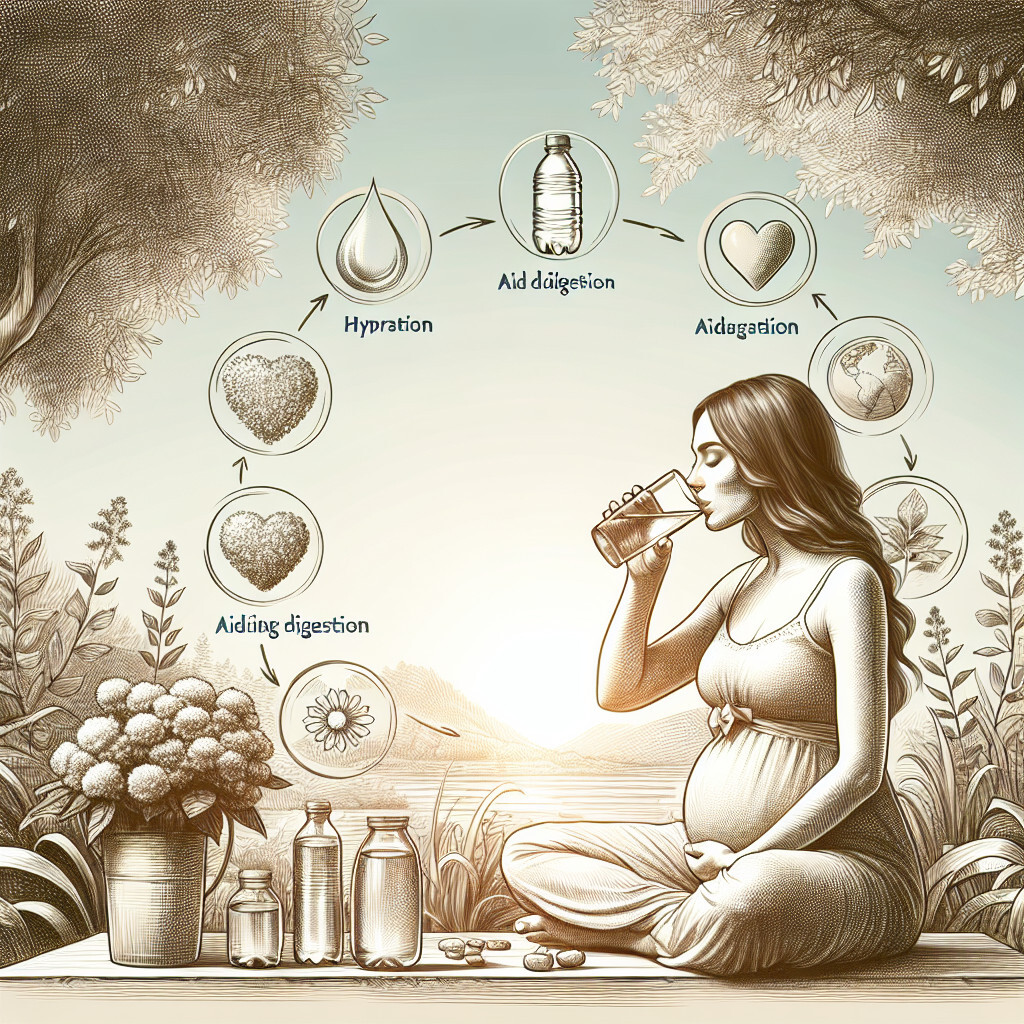-
Table of Contents
- Introduction
- Maximizing Maternal Health: The Importance of Water Intake During Pregnancy
- Hydration and Pregnancy: How Water Contributes to a Healthy Gestation
- The Role of Water in Fetal Development: Health Benefits for Expectant Mothers
- Drinking Water During Pregnancy: Boosting Maternal and Fetal Health
- Q&A
- Conclusion
“Hydrating for Two: Nourishing Mother and Baby with Every Sip”
Introduction

Drinking water during pregnancy is crucial for the health and wellbeing of both the mother and the developing fetus. Adequate hydration helps in maintaining amniotic fluid levels, aids in the delivery of essential nutrients to the fetus, reduces swelling, prevents urinary tract infections, and reduces the risk of preterm labor and constipation. It also supports the increased blood volume during pregnancy and aids in digestion. Therefore, water plays a significant role in ensuring a healthy pregnancy.
Maximizing Maternal Health: The Importance of Water Intake During Pregnancy
Maximizing maternal health is a critical aspect of ensuring both the mother and the baby’s well-being during pregnancy. One of the most effective ways to achieve this is through adequate water intake. Drinking water during pregnancy offers numerous health benefits that contribute significantly to the overall wellness of the mother and the developing fetus.
Water plays a vital role in the body’s physiological processes, and its importance is magnified during pregnancy. It aids in the formation of the placenta, which is the baby’s lifeline in the womb, supplying essential nutrients and oxygen. Additionally, water is instrumental in the creation of the amniotic sac, a protective environment where the baby grows and develops.
Adequate hydration is also crucial in maintaining the mother’s health. It helps in the prevention of urinary tract infections, which are common during pregnancy due to changes in the urinary tract. Drinking sufficient water dilutes the urine, reducing the likelihood of infections. Moreover, water aids in digestion, preventing constipation, a common discomfort experienced by many pregnant women. It softens the stool and promotes regular bowel movements, thereby alleviating constipation.
Furthermore, staying hydrated can help manage pregnancy-related symptoms such as nausea and vomiting, commonly known as morning sickness. While the exact cause of morning sickness is unknown, studies suggest that it may be linked to changes in hormones. Drinking water, especially in small sips throughout the day, can help soothe the stomach and reduce feelings of nausea.
Water intake is also beneficial in preventing dehydration, a condition that can lead to serious complications during pregnancy, such as low amniotic fluid, inadequate breast milk production, and even premature labor. Dehydration can also cause symptoms such as headaches, fatigue, and dizziness, which can be particularly distressing during pregnancy. Therefore, drinking enough water is essential to avoid these complications and ensure a healthy pregnancy.
Moreover, water plays a significant role in maintaining the elasticity of the skin, which can help in managing stretch marks, a common concern among pregnant women. While it may not completely prevent them, staying hydrated can help the skin stretch more comfortably as the belly grows, reducing the severity of stretch marks.
In addition to the numerous health benefits, drinking water can also aid in weight management during pregnancy. It helps in maintaining a healthy metabolism and curbing excessive weight gain, which can lead to complications such as gestational diabetes and preeclampsia.
In conclusion, the importance of water intake during pregnancy cannot be overstated. It plays a crucial role in the mother’s health and the baby’s development, helping to prevent complications and manage pregnancy-related symptoms. Therefore, pregnant women should make a conscious effort to stay hydrated, not only for their well-being but also for the health of their developing baby. However, it is essential to remember that while water is vital, it should be consumed in moderation, as excessive water intake can lead to water intoxication. As with all aspects of pregnancy, it is always best to consult with a healthcare professional to determine the appropriate amount of water intake.
Hydration and Pregnancy: How Water Contributes to a Healthy Gestation
Hydration and Pregnancy: How Water Contributes to a Healthy Gestation
Water, the most abundant and essential element on earth, plays a crucial role in maintaining overall health. Its importance becomes even more pronounced during pregnancy, a period characterized by increased physiological demands and changes. Drinking an adequate amount of water during pregnancy not only ensures the health of the expectant mother but also contributes significantly to the development and well-being of the unborn child.
The human body is approximately 60% water, and during pregnancy, this vital fluid performs several critical functions. It aids in the absorption of essential nutrients and their transportation to the blood cells, which subsequently deliver them to the baby. This process is vital for the baby’s growth and development. Moreover, water serves as the backbone of the amniotic fluid that cushions the baby in the womb, protecting it from potential harm and allowing it to move freely, which is crucial for muscular and skeletal development.
Additionally, water plays a pivotal role in the formation of the placenta, the organ that supplies the fetus with the necessary nutrients and oxygen. A well-hydrated body ensures a healthy and robust placenta, thereby promoting optimal fetal development. Furthermore, water aids in the prevention of urinary tract infections, constipation, and hemorrhoids, common issues that pregnant women often face due to hormonal changes and the physical pressure of carrying a baby.
Drinking sufficient water can also help manage some of the less pleasant symptoms of pregnancy. For instance, adequate hydration can alleviate morning sickness, heartburn, and indigestion, which are common during the first trimester. It can also help reduce swelling and edema, common complaints in the later stages of pregnancy.
Moreover, staying well-hydrated can help maintain an optimal body temperature. Pregnant women often experience changes in their body temperature due to hormonal fluctuations. Drinking water helps regulate these changes, ensuring the mother’s comfort and the baby’s safety.
However, while the benefits of drinking water during pregnancy are manifold, it is essential to note that the quality of water consumed is equally important. Expectant mothers should ensure that the water they drink is clean and safe to prevent waterborne diseases that could potentially harm them or their unborn child.
In terms of quantity, while the adequate intake varies depending on factors such as weight, activity level, and climate, a general guideline is to consume at least 8-10 glasses of water per day. This amount should be increased in hot weather or during physical activity to compensate for the additional water loss through sweating.
In conclusion, water is a vital component of a healthy pregnancy. It aids in the development of the baby, supports the mother’s health, and helps manage pregnancy symptoms. Therefore, expectant mothers should make it a priority to stay well-hydrated, ensuring they consume clean, safe water in adequate amounts. By doing so, they can contribute significantly to a healthy gestation and ultimately, the birth of a healthy baby.
The Role of Water in Fetal Development: Health Benefits for Expectant Mothers
Water, the most abundant and essential compound on earth, plays a pivotal role in the overall health and well-being of every living organism. Its importance becomes even more pronounced during pregnancy, a period characterized by rapid growth and development. The role of water in fetal development is multifaceted, offering numerous health benefits for expectant mothers.
To begin with, water is the primary component of amniotic fluid, the protective substance that surrounds the fetus in the womb. This fluid not only cushions the baby from external shocks but also aids in the development of the lungs and digestive system. By drinking adequate amounts of water, pregnant women can ensure the optimal production and maintenance of amniotic fluid, thereby promoting the healthy growth of their unborn child.
Moreover, water plays a crucial role in the transportation of essential nutrients and oxygen to the fetus. It aids in the absorption of water-soluble vitamins and minerals, and facilitates their delivery through the placenta. This nutrient-rich blood supply is vital for the development of the fetus, particularly for the formation of the neural tube, which later becomes the brain and spinal cord. Therefore, staying well-hydrated can significantly contribute to the neurological development of the baby.
In addition to supporting fetal development, drinking water offers several health benefits for the expectant mother as well. It helps in maintaining the volume of blood and bodily fluids, which tend to increase during pregnancy. This, in turn, can prevent common pregnancy-related complications such as dehydration, constipation, and urinary tract infections. Furthermore, water can alleviate symptoms of morning sickness and heartburn, both of which are common discomforts experienced by pregnant women.
Water also plays a significant role in preventing edema, a condition characterized by swelling in the hands, feet, and ankles due to fluid retention. This condition is common in the later stages of pregnancy when the body tends to retain more water. By promoting kidney function and helping to flush out excess fluids and toxins, adequate water intake can help to mitigate this condition.
Lastly, drinking water can aid in preparing the body for the birthing process. It helps to keep the body hydrated and energized, which is crucial for enduring labor. Moreover, it aids in the production of breast milk, which is the primary source of nutrition for the baby after birth.
In conclusion, the role of water in fetal development and maternal health cannot be overstated. It is a vital component in the formation and maintenance of amniotic fluid, the transportation of nutrients to the fetus, and the prevention of common pregnancy-related complications. Therefore, expectant mothers should make it a priority to stay well-hydrated throughout their pregnancy. While the recommended daily water intake varies depending on factors such as weight, physical activity, and climate, a general guideline is to drink at least eight 8-ounce glasses of water per day. However, it is always advisable to consult with a healthcare provider for personalized advice.
Drinking Water During Pregnancy: Boosting Maternal and Fetal Health
Drinking water during pregnancy is a fundamental aspect of prenatal care that is often overlooked. However, it plays a crucial role in boosting both maternal and fetal health. The importance of hydration cannot be overstated, especially during pregnancy, when the body’s demand for water significantly increases.
Water is the primary component of amniotic fluid, which serves as a protective cushion and aids in the development of the fetus’s lungs and digestive system. Therefore, maintaining an adequate level of hydration is essential for the production and replenishment of this fluid. Moreover, water aids in the transportation of essential nutrients to the fetus through the placenta, thereby supporting its growth and development.
In addition to supporting fetal health, drinking water during pregnancy offers numerous benefits for the mother. It aids in the digestion process and helps prevent constipation, a common issue during pregnancy. By keeping the body hydrated, water also helps to reduce swelling and water retention, which are common discomforts experienced by pregnant women. Furthermore, staying hydrated can help to alleviate pregnancy-related headaches and can even reduce the risk of urinary tract infections, which are more common during pregnancy.
Drinking water also plays a crucial role in maintaining the mother’s overall health. It aids in the regulation of body temperature, which can fluctuate during pregnancy. Moreover, it helps to flush out toxins from the body, thereby reducing the risk of infections and diseases.
However, while the benefits of drinking water during pregnancy are numerous, it is important to note that the quality of water consumed is equally important. Pregnant women should ensure that the water they drink is clean and safe to avoid any potential health risks. Contaminated water can lead to serious health issues, including waterborne diseases that can adversely affect both the mother and the fetus. Therefore, it is advisable to drink filtered or boiled water to ensure its safety.
The recommended daily water intake for pregnant women is about 8-10 glasses, but this can vary depending on individual needs and lifestyle factors. For instance, women who engage in physical activity or live in hot climates may require more water. It is also worth noting that other fluids, such as milk and juice, can contribute to daily hydration needs. However, these should not replace water as the primary source of hydration.
In conclusion, drinking water during pregnancy is not just about quenching thirst. It is a vital part of prenatal care that contributes significantly to the health and well-being of both the mother and the fetus. By maintaining proper hydration, pregnant women can support their body’s functions, alleviate pregnancy-related discomforts, and provide a conducive environment for the growth and development of their baby. Therefore, it is essential for pregnant women to make drinking water a priority in their daily routine.
Q&A
Question 1: What are the health benefits of drinking water during pregnancy?
Answer: Drinking water during pregnancy helps maintain the amniotic fluid levels, aids in the delivery of essential nutrients to the fetus, reduces swelling, prevents urinary tract infections, and helps in digestion.
Question 2: How does water intake affect the amniotic fluid?
Answer: Adequate water intake helps maintain the level of amniotic fluid which is essential for the baby’s growth and development. It provides a cushion for the baby and aids in the development of the digestive system.
Question 3: Can drinking water help reduce swelling during pregnancy?
Answer: Yes, staying hydrated can help reduce swelling during pregnancy. Water helps in flushing out waste products from the body and reduces water retention, thereby reducing swelling in the feet, ankles, and hands.
Question 4: How does drinking water prevent urinary tract infections during pregnancy?
Answer: Drinking plenty of water helps dilute the urine and ensures that you urinate more frequently, flushing out bacteria from the urinary tract. This reduces the risk of urinary tract infections, which are common during pregnancy.
Conclusion
Drinking water during pregnancy provides numerous health benefits including maintaining hydration, aiding in digestion, preventing urinary tract infections, reducing swelling, and contributing to the healthy development of the fetus. It also helps in the formation of the placenta and amniotic fluid. Therefore, water intake is crucial for the health and well-being of both the mother and the baby during pregnancy.






